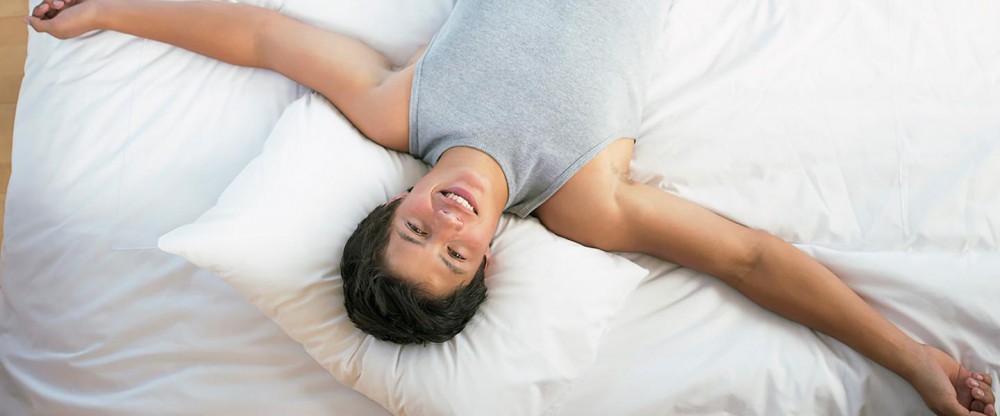How does exercise help those with chronic insomnia?
For more information about Insomnia, visit National Sleep Foundation's official Insomnia hub.
Chronic insomnia, defined as difficulty initiating or maintaining sleep, awakening too early in the morning, or nonrestorative sleep, is the most common sleep disorder among adults. Though exercise has long been assumed to improve sleep, surprisingly little research has been conducted on the effect of exercise on chronic insomnia.
Of the handful of studies that have been performed, they suggest that exercise significantly improves the sleep of people with chronic insomnia. The only study that looked at the effects of a single exercise session found that a bout of moderate-intensity aerobic exercise (e.g., walking) reduced the time it took to fall asleep and increased the length of sleep of people with chronic insomnia compared to a night in which they did not exercise. However, in the same study, vigorous aerobic exercise (e.g., running) or lifting weights did not improve sleep. Similar results have been found for studies that examined the effects of long-term exercise on sleep in adults with insomnia. In these studies, after 4 to 24 weeks of exercise, adults with insomnia fell asleep more quickly, slept slightly longer, and had better sleep quality than before they began exercising.
Although the exact mechanisms are unknown, there are many possibilities for how exercise may reduce insomnia severity. One way may be by the body-heating effects of exercise, especially when performed in the afternoon or later. Exercise triggers an increase in body temperature, and the post-exercise drop in temperature may promote falling asleep. Exercise may also reduce insomnia by decreasing arousal, anxiety and depressive symptoms. Insomnia is commonly linked with elevated arousal, anxiety, and depression, and exercise has strong effects on reducing these symptoms in the general population. Finally, exercise may reduce insomnia by its effects on circadian rhythms (body clock). For people with insomnia due to the timing of their body clock, exercise may shift its timing depending upon the time exercise is performed.
We still need to learn much more about the relationship between exercise and chronic insomnia. For instance, we do not know how exercise compares to other insomnia treatments, especially sleep medications. We also know little about what types of exercise improve sleep the most, how much exercise is needed to improve sleep, and what time of day is best for exercise to improve sleep in people with insomnia. However, from the available evidence, exercise does hold great promise for improving the sleep of those with chronic insomnia.
References:
Guilleminault C, Clerk A, Black J, Labanowski M, Pelayo R, Claman D. Nondrug treatment trials in psychophysiologic insomnia. Arch Intern Med. 1995;155(8):838-44.
Horne JA, Staff LH. Exercise and sleep: body-heating effects. Sleep. 1983;6(1):36-46.
Passos GS, Poyares D, Santana MG, D'Aurea CV, Youngstedt SD, Tufik S, de Mello MT. Effects of moderate aerobic exercise training on chronic primary insomnia. Sleep Med. 2011;12(10):1018-27.
Passos GS, Poyares D, Santana MG, Garbuio SA, Tufik S, de Mello MT. Effect of acute physical exercise on patients with chronic primary insomnia. J Clin Sleep Med. 2010;6(3):270-275.
Reid KJ, Baron KG, Lu B, Naylor E, Wolfe L, Zee PC. Aerobic exercise improves self-reported sleep and quality of life in older adults with insomnia. Sleep Med. 2010;11(9):934-40.
The right head support can greatly improve how comfortable you feel in bed.Learn more about how these medical devices can make a big difference in nighttime comfort for people with breathing issues.Is pain keeping you awake? Find out why pain affects sleep and what you can do to sleep better.A frequent need to get up and go to the bathroom to urinate at night is called nocturia. It differs...Nearly one-quarter of all workers have shifts that are not during the daytime, and more than two-thirds of these workers...The Electronics and Sleep infographic highlights how technology affects the modern family and how parents can help design a sleep...Orexin receptor antagonists: A new class of sleeping pill Find out more about orexin, and a new type of sleep...You don't have to struggle with sleepless nights. Help is available! There are treatment options for insomnia, ranging from behavioral...Great news: more than three-fourths (76%) of those surveyed say that they had a good night’s sleep at least a...Having a normal sleep schedule—meaning you go to bed and wake up around the same time every day—can help your...

Source: Internet





